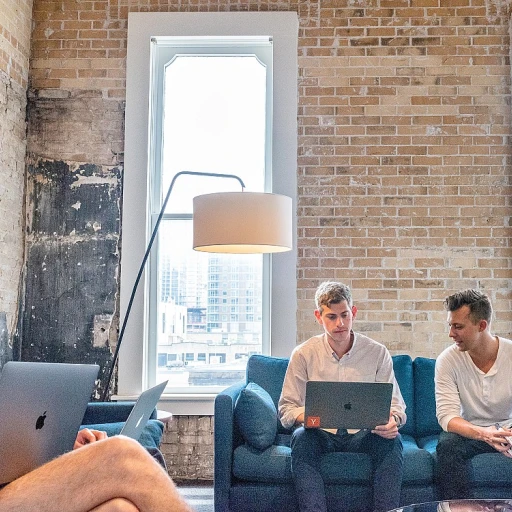The Millennial Workforce: Who Are They?
Who Are Millennials in the Workforce?
Ah, the Millennials. Often misunderstood but undeniably influential, this generation is making waves in workplaces worldwide. Born roughly between 1981 and 1996, they represent a vibrant mix of cultural shifts and technological influence. As digital natives, Millennials bring unique perspectives and expectations to their jobs. Their appetite for change is reshaping how companies think about compensation and benefits. Millennials are no longer the 'next gen'—they are, in fact, the current workforce. Their approach to work often differs from their predecessors, like the Baby Boomers, with a greater focus on work-life balance, mental health, and mindful living. They want a workplace that respects their life goals and offers flexibility. This generational cohort isn't solely about the paycheck. They're savvy and expect employers to acknowledge that financial compensation is just one piece of the puzzle when it comes to job satisfaction. They look beyond basic salaries to see if the benefits package offers real value through options like student loan assistance, health insurance, and paid time off. Employers should take note of their demands for health-related perks, which often mean more than just standard health care and insurance. With a focus on mental health, companies looking to attract and keep this talent need to innovate. Offering benefits that suit a Millennial lifestyle captures their attention and boosts engagement. The rise of remote work showcases how these employees desire flexible work arrangements. Millennials expect to work in environments that foster their life balance, and businesses aiming to attract and retain them must adapt accordingly. As such, exploring trends in employee compensation and benefits has become essential for any company aiming to attract this invaluable workforce.Prioritizing Flexibility and Work-Life Balance
Flexibility: The New Workplace Currency
In a world where the lines between work and personal life are increasingly blurred, millennials are championing a shift in workplace culture. They aren't just clocking in and out; they're seeking a balance that allows them to thrive both professionally and personally. This generation, often juggling multiple roles and responsibilities, values flexibility like no other. Employers who understand this need for flexible work arrangements are more likely to attract and retain top talent.
Remote work options, flexible hours, and the ability to manage work-life balance are not just perks; they're essentials for millennials. This generation has witnessed the evolution of technology and understands its potential to create a more adaptable work environment. Companies that embrace this shift not only support their employees' mental health but also boost productivity and job satisfaction.
Work-Life Balance: More Than Just a Buzzword
For millennials, achieving work-life balance isn't just about managing time; it's about creating a fulfilling life. This generation prioritizes experiences over material possessions, and they seek jobs that allow them to enjoy both. Employers offering benefits that support this balance, such as paid time off, mental health days, and comprehensive health insurance, are more appealing to millennial employees.
Moreover, companies that promote a culture of well-being and support, rather than just focusing on the bottom line, resonate more with this generation. Millennials are drawn to workplaces that respect their need for personal growth and development, both in and out of the office.
Breaking Away from Traditional Norms
Unlike baby boomers, millennials are redefining what it means to be successful at work. They value experiences and personal fulfillment over a hefty paycheck. While financial compensation is important, millennials are more likely to choose a job that offers a comprehensive benefits package, including student loan assistance, health benefits, and opportunities for professional development.
This shift in priorities is a wake-up call for employers. To attract and retain millennial gen workers, companies need to rethink their benefits packages. Offering perks that align with millennials' values and lifestyle choices is no longer optional; it's a necessity.
For more insights into how companies are adapting to these changing needs, check out the latest trends in employee compensation and benefits.
Financial Compensation: Beyond the Paycheck
Thinking Beyond the Paycheck: Crafting Attractive Compensation Offers
When considering financial compensation for the millennial workforce, the paycheck isn't the only thing that counts. Sure, a competitive salary will always grab attention, but millennials are looking for more. This generation appreciates a holistic approach that includes options like performance bonuses, stock options, and student loan repayment. One thing millennials consistently rank high on their list is flexibility. Flexible work arrangements can offer that precious work-life balance most crave. Employers can incorporate benefits like flexible work hours or remote work options to attract and keep top millennial talent. Healthcare is another big-ticket item. Health benefits are crucial, with millennials paying close attention to what different plans cover and how much it will cost them out of pocket. Offering comprehensive health insurance options, including mental health programs, can indicate to potential employees that a company genuinely cares about their well-being. Paid time off, or PTO, is often a dealmaker, too. This generation values time, both work-related and personal. Competitive benefits packages often include generous PTO policies that allow millennials to recharge and pursue passions outside of work. Millennials might also prefer options like retirement plan matching or education reimbursement to help them secure their financial futures while feeling supported in pursuing personal development. Additionally, creativity can set a company apart. Whether it’s unique bonuses or supporting causes important to the millennial workers, creative benefits can show employees their company values them as individuals. When employers align their benefits packages with millennial values and needs, they not only attract and retain the younger generation but also foster a more engaged and loyal workforce. For more insights on the types of benefits packages that can work wonders, check out perks for part-time workers.The Role of Non-Monetary Benefits
More Than Just a Paycheck
When it comes to employee benefits, millennials are shaking things up in the workplace. They want more than just a paycheck; they’re looking for a benefits package that speaks to their work-life balance, mental health, and overall well-being. This generation is all about finding value in non-monetary benefits that enhance their lives both in and out of the office.
Flexibility and Freedom
For many millennial employees, flexible work arrangements and remote work options are high on their list of priorities. Unlike baby boomers who might have been content with a traditional 9-to-5 job, gen millennials crave the freedom to work where and when they’re most productive. This flexibility allows them to balance work with personal commitments, leading to happier and more engaged employees.
Mental Health and Wellness
Mental health is a big deal for millennials, and they expect their employers to take it seriously. Offering mental health support and wellness programs can make a company stand out in the eyes of this generation. Whether it’s access to counseling services or gym memberships, these benefits help employees maintain a healthy work life and personal life balance.
Health Insurance Matters
While non-monetary perks are important, health insurance remains a cornerstone of any benefits package. Millennials are keenly aware of the importance of health care, and they value comprehensive health benefits that cover both physical and mental health needs. Employers who provide robust health insurance options are more likely to attract and retain top talent from this generation.
Student Loan Assistance
With many millennials carrying significant student loan debt, companies offering student loan assistance are gaining a competitive edge. This benefit not only eases financial burdens but also demonstrates that the employer is invested in the long-term success of their employees.
By understanding and addressing the unique needs of the millennial workforce, companies can build a benefits package that not only attracts but also retains this generation of workers. It’s about creating a workplace that values the whole person, not just the employee.
Technology and Its Impact on Benefits
Tech-Driven Benefits: Changing the Game
Technology is shaking things up in the workplace, and millennials are loving it. This generation, unlike baby boomers, grew up with tech at their fingertips, so it's no surprise they expect the same in their jobs. Employers are catching on and using tech to offer benefits that resonate with millennials' needs.
Remote Work and Flexibility
One of the biggest perks technology offers is the ability to work remotely. For millennials, who value work-life balance and flexible work arrangements, this is a game-changer. It allows them to manage their work and personal life more effectively, which is a huge plus for mental health. Companies that offer remote work options often find it easier to attract and retain millennial talent.
Health and Wellness Apps
Health benefits are another area where tech is making a splash. Companies are now offering wellness apps that help employees track their health, meditate, or even find mental health support. These apps can be a part of a broader health benefits package, showing employees that their well-being is a priority. Millennial employees appreciate having these tools at their disposal, as they align with their focus on health and wellness.
Student Loan Assistance
With many millennials burdened by student loans, some companies are stepping up by offering student loan assistance as part of their benefits package. Technology plays a role here too, with platforms that help manage and pay off loans. This kind of support can make a job offer much more appealing to gen workers who are looking for financial relief.
Digital Platforms for Benefits Management
Gone are the days of paper forms and complicated processes. Now, digital platforms allow employees to manage their benefits with ease. These platforms provide a one-stop-shop for health insurance, paid time off, and other employee benefits. This ease of access is a big win for millennials who prefer to handle everything online.
Incorporating technology into benefits is not just about keeping up with trends; it's about meeting the expectations of a tech-savvy generation. Employers who embrace these changes are more likely to attract and retain the best talent in the millennial workforce.
Tailoring Benefits to Meet Millennial Needs
Crafting Benefits that Speak to Millennial Employees
When talking about benefits millennials crave, it's not a one-size-fits-all kind of thing. This generation values different perks compared to the baby boomers, often focusing on aspects that align with their lifestyle and goals. To attract and retain talent among millennials gen, employers need to be innovative and consider what resonates with them.
Flexibility tops the chart for gen millennials. They're not bound by traditional job frameworks. Remote work and flexible hours allow them to maintain a better work-life balance, catering to the modern employee needing room to breathe.
Financial well-being extends beyond just a paycheck. Many in the workforce carry the burden of student loans. Employers offering student loan repayment benefits grab their attention, setting themselves apart as empathetic and forward-thinking organizations.
Health is not just about physical fitness anymore. Mental health support has gained crucial importance. Providing comprehensive mental health benefits shows a company cares about its employees as individuals. Health insurance that covers both physical and mental health aspects is a big win.
Millennials also appreciate paid time off policies that allow them to explore interests outside work. It's about experiencing life while ensuring they're rested and ready when clocking back in.
By understanding what this generation values, employers can craft a benefits package that not only attracts but retains a vibrant and engaged workforce. It's about stepping into the shoes of millennial employees, acknowledging their challenges, and offering a helping hand.





